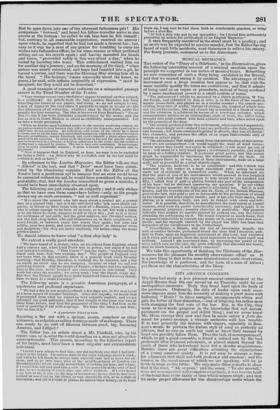MUSICAL MECHANICS.
THE writer of the "Diary of a Dilettante," in the Harmonicon, gives the following interesting account of a musical machine upon the principle we suggested in our notice of musical boxes. Something we now remember of such a thing being exhibited in the Strand, and that we missed seeing it by accident. The advantages of this instrument over a large musical box appear. to be, that with the same metallic quality the tones are continuous ; and that it admits of being used as an organ or pianoforte, instead of being confined by a mere mechanical power to a small routine of tunes.
"The instrument I allude to, invented by a Dutch gentleman, M. Van der Burgh, and exhibited by him in 1814, is in the form of the smallest square piano-forte, and played on in a similar manner ; the sounds pro- ceeding from bars of metal, instead of strings, the longest of which does not exceed five inches. One end of each bar is inserted in a block of wood, and the vibration is inloduced by means of a revolving cylinder, which communicates motion to an intermediate plate of brass, the latter being brought into joint contact with both cylinder and bars, when acted upon by the pressure of the keys. '' The sounds produced from this instrument, when rendered separately, imitate exceedingly well—indeed I may say perfectly,-the flute, clarionet, and bassoon ; but when combined together in chords, they lose all distinc- tive character, and produce the effect of an organ that consists only of unison or octave pipes. "The advantages that might result from the introduction of this instru- ment are not unimportant :—it would supply the want of wind instru- ments where they could not easily be obtained; it will never go out of tune ; will stand in a very small space ; is extremely portable, and might be made at a trifling expense. It possesses great power, and this power might be augmented by increasing the dimensions of the bars. At Copenhagen there is, or was, one of these instruments, made on a large scale, and as powerful as a great church-organ.
"The expense, however, is to be considered: and this I think was estimated by the maker at a most exorbitant rate ; unless he really made use of materials in themselves costly. When he informed me that the price of one of his instruments would amount to two hundred guineas, and added that the expense to him would be one hundred and fifty, 1 asked him if gold or platina formed any part of the composition of his bars ; but he declined answering my question. If he use either of these in any quantity, the high price is accounted for. But it is well known, and the experiments of the late Dr. Gray, of the British Museum, proved the fact, that gold is not so favourable to the production of sound as the cheaper and more elastic metals : and it has also been shown, that platina, as a sonorous body, can only be ranked with silver and bell- metal. It is possible, therefore, to manufacture the instrument at a small expense, even were its power considerably increased, and to apply it to many musical purposes ; country churches in particular. The greatest difficulty that seemed to operate against its general use, was the labour attending the performing on it. The touch required so much force, that it appeared impossible to execute any music on it, except very slow move- ments: and the strength exerted by the player was little less than that demanded of the Carilioneurs in the Netherlands.
" Nevertheless, a female, and not one of Amazonian muscle, the wife of another inventor, performed about the time that I mention, pub- licly in Paris, upon an improved instrument of this kind, and executed on it every sort of music, from the most expressive to the most rapid and brilliant. Indeed I am convinced that, by increasing the power of the lever which acts on the bars, the great difficulty that attended the touch, may be much lessened, if not wholly removed."
We take this opportunity of thanking the Dilettante of the Har - monicon for the pleasure his monthly observations afford us. It is a rare thing to find in the same musical writer acute observation, the knowledge of a professor, and the taste of a man of letters ; yet these are the characteristics of the Diary.


















 Previous page
Previous page